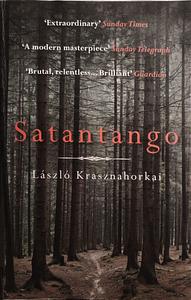Take a photo of a barcode or cover
A postmodernist masterpiece that could not have come at a better time in my life (or worse? I guess it depends on framing). Who really controls the fate of our lives? Are we able to exert any form of self will or are we bound to whims of the nearest link above us? Who is the exploited and are they really that far removed from the exploiters? We are all in pain in the end
honk shoo mi mi mi. this was a book club read, and the first one i haven't finished. the atmosphere created in the novel is interesting, as are the petty neighbourhood squabbles. the style is unique. it is not an inherently worthless book. i am just soooo fucking bored, i have negative interest in reading any more of this.
i just finished house of house of day, house of night by olga tokarczuk and it's this book except, like, it's fucking interesting. i'm gonna go read something else
i just finished house of house of day, house of night by olga tokarczuk and it's this book except, like, it's fucking interesting. i'm gonna go read something else
A perfect novel. You can feel your bones chill and the rain dripping from your face. Artfully translated from the original Hungarian to English by George Szirtes.
"Because there is in numbers a mysterious evidentiary quality, a stupidly undervalued 'grave simplicity' and, as a product of the tension between these two ideas a spine-tingling concept might arise, one that proclaimed: 'Perspectives do exist.'
"Because there is in numbers a mysterious evidentiary quality, a stupidly undervalued 'grave simplicity' and, as a product of the tension between these two ideas a spine-tingling concept might arise, one that proclaimed: 'Perspectives do exist.'
Ambientato in un villaggio ungherese devastato da una pioggia perenne e dall'apatia dei suoi abitanti, sfiancati dal colletivismo comunista e incapaci di reagire dalla sua caduta, il romanzo mostra una parata di personaggi che incarnano tutti i vizi dell'umanità più abbruttita, vizi che si possono riassumere con quel tipo di credulità che porta ala gregarietà: al seguire un leader senza porsi domande. Nessuno si salva, non il Dottore, che pure osserva dall'esterno prendendo minuziosi appunti, ma che pur osservando non capisce cosa succede, e nemmeno la piccola Estike, che pure è una vittima. In questa miseria morale ha facile gioco Irimiás, un criminale di bassa lega che con le sue pur scarse doti carismatiche riesce a proporsi come un salvatore e a disperdere la piccola comunità - che disprezza - utilizzando i singoli per i propri scopi.
Il romanzo è abbastanza sbilanciato. La prima parte, quella dell'attesa, in cui i personaggi in qualche modo vengono presentati, presenta pagine capaci di tenere incollato il lettore. La seconda, quando Irimiás entra in scena e prede in mano le redini dell'azione, è invece zoppicante e decisamente meno convincente.
Il romanzo è abbastanza sbilanciato. La prima parte, quella dell'attesa, in cui i personaggi in qualche modo vengono presentati, presenta pagine capaci di tenere incollato il lettore. La seconda, quando Irimiás entra in scena e prede in mano le redini dell'azione, è invece zoppicante e decisamente meno convincente.
I just really couldn’t get on with this writing style. I still have no idea what this book was about. It just wasn’t the right read for me
challenging
dark
mysterious
slow-paced
Plot or Character Driven:
A mix
Strong character development:
No
Loveable characters:
No
Diverse cast of characters:
Yes
Flaws of characters a main focus:
Yes
I finished reading Satantango on a rainy day. It's been raining almost every day for weeks. My dehumidifier at home has been working extra hard; I have to empty its tank thrice a day. January in Singapore isn't supposed to be this rainy. (Climate change is real.) But it provided the perfect setting for me. The story takes place in a Hungarian village occupied by a bunch of drunk, perverted and honestly dull-witted characters. They kind of love and hate each other. And I kind of love and hate them. The ambiance is as depressing as it can get, but I loved every bit of it. Constant rain, lots of mildew and spiderwebs. It's heavy and airless. And very, very bleak.
This is not an easy read. I started on this almost 2 weeks ago and almost DNF'ed it, pausing and moving on to other books at 50%. The prose was beautifully written, but I was completely lost in the plot. Surely, after plowing through half the book, I must have a general idea of the story? What was I missing? Am I too dumb for this? Throughout the book, I felt like I was trying to get a vague outline of the narrative through a pair of smeary glasses dirtied with rainwater, mould and splatters of mud. The more I try to wipe the lenses, the blurrier my vision gets. But here's the thing – that is Krasznahorkai's very intention. Things will only begin to make sense towards the end, when he presents you with a potent detergent to finally wash all the grime away. Once you can see clearly, you'll be stunned.
I revisited some chapters at the front and they read much more freely, much more gloriously. For me this definitely deserves a reread sometime down the road.
If you're struggling with this book, it's understandable. But my suggestion is to really study the naming of the chapters as an overarching guide, and then approach every chapter as an individual short story. Don't try to piece them together. Don't even try to understand it. Don't expect a linear narrative to be spoon-fed to you because you're not getting any of that. Instead, enjoy his meandering sentences and flow along with it. Relax and appreciate the scenery along the way... yes, all the scenery that is fetid and decaying. This masterpiece is, as quoted from the book, all about the "triumphant, mad and contrary" nature of the world. All the trudging through the mud was worth it for me.
This is not an easy read. I started on this almost 2 weeks ago and almost DNF'ed it, pausing and moving on to other books at 50%. The prose was beautifully written, but I was completely lost in the plot. Surely, after plowing through half the book, I must have a general idea of the story? What was I missing? Am I too dumb for this? Throughout the book, I felt like I was trying to get a vague outline of the narrative through a pair of smeary glasses dirtied with rainwater, mould and splatters of mud. The more I try to wipe the lenses, the blurrier my vision gets. But here's the thing – that is Krasznahorkai's very intention. Things will only begin to make sense towards the end, when he presents you with a potent detergent to finally wash all the grime away. Once you can see clearly, you'll be stunned.
I revisited some chapters at the front and they read much more freely, much more gloriously. For me this definitely deserves a reread sometime down the road.
If you're struggling with this book, it's understandable. But my suggestion is to really study the naming of the chapters as an overarching guide, and then approach every chapter as an individual short story. Don't try to piece them together. Don't even try to understand it. Don't expect a linear narrative to be spoon-fed to you because you're not getting any of that. Instead, enjoy his meandering sentences and flow along with it. Relax and appreciate the scenery along the way... yes, all the scenery that is fetid and decaying. This masterpiece is, as quoted from the book, all about the "triumphant, mad and contrary" nature of the world. All the trudging through the mud was worth it for me.
“‘God was a mistake. I’ve long understood there is zero difference between me and a bug, or a bug and a river, or a river and a voice shouting above it. There’s no sense or meaning in anything. It’s nothing but a network of dependency under enormous fluctuating pressures. It’s only our imaginations, not our senses, that continually confront us with failure and the false belief that we can raise ourselves by our own bootstraps from the miserable pulp of decay. There’s no escaping that, stupid.’”
bleak, mud-sodden, engrossing!
bleak, mud-sodden, engrossing!
Le estoy dando 5 estrellas a una novela paradigmáticamente moderna, ¿en qué me estoy convirtiendo?
challenging
dark
mysterious
reflective
sad
tense
slow-paced
Plot or Character Driven:
A mix
Strong character development:
No
Loveable characters:
No
Diverse cast of characters:
No
Flaws of characters a main focus:
Yes






